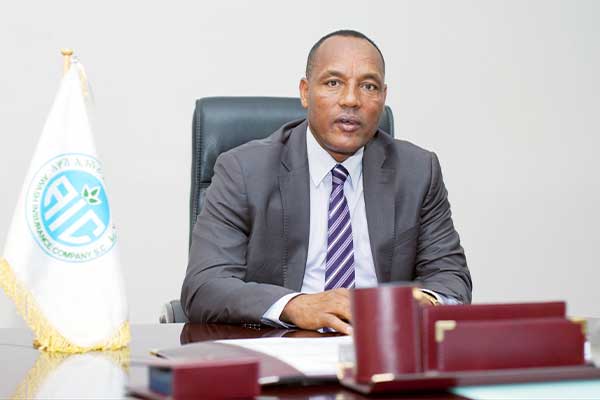
Commentaries | Nov 23,2019
Awash Bank maintains its leading position in the private financial industry posting a record high profit boosted by a newly implemented management strategic plan.
The bank reported 1.4 billion Br in net profits during the last fiscal year, a 35pc increase from the preceding year. The rise in profit has led to an increase in shareholders return, 543 Br, and paid up capital of 2.9 billion Br.
Compared to its closest competitor, Dashen Bank, Awash's net profit exceeds Dashen's by 35pc. In the reporting period, Dashen Bank registered a net profit of 904 million Br. The third profitable bank in the country, Wegagen Bank, netted 793.5 million Br in profit.
The management strategy plan of the bank, developed by KPMG Management Consulting three years ago, played a great role for the bank in achieving the positive outcomes, according to Tsehay Shiferaw, Awash's president.
“With the road map, we identified the major challenges and opportunities," Tsehay told Fortune. "It helped us in outlining our focus areas such as investing in human resources, technology and service delivery."
Revenues at the bank have also increased. It has generated 830 million Br from fees and commissions and 151.6 million Br from other income.
However, the Bank's revenue from foreign exchange dealings decreased by 18pc to 224.6 million Br.
The bank reported 1.4 billion Br in net profits during the last fiscal year, a 35pc increase from the preceding year. The rise in profit has led to an increase in shareholders return, 543 Br, and paid up capital of 2.9 billion Br.
The public unrest in the country, the stringent regulations from the central bank and the severe forex crunch have caused the decline of earnings from foreign exchange, according to the president.
Last year the National Bank of Ethiopia (NBE) compelled all banks to cede 30pc of their forex to it at the buying rate.
"Despite the challenges, the Bank was successful in earning better forex dealings," said Tsehay.
A surge in expenses accompanied the income rise. Expenses including interest, operational and administrative cost have reached 3.4 billion Br, a 41pc rise.
Out of the total expense, interest expense took the lion's share and accounted for 1.4 billion Br, a 62pc increase from two years ago. Awash also spent 1.2 billion Br on personnel costs and 749.89 million Br on operating expenses.
Staff salary and benefit adjustment and branch expansion caused the surge in operating expenses, according to Tsehay.
Last year the Bank recruited 1,350 employees, bringing the total staff size to 7,881. The Bank also opened 50 new branches, which pushed the total number to 366.
Deposit mobilization was the other strong performance of the Bank. Last financial year, Awash mobilised 45.9 billion Br, a 41.5pc increase.
“We worked on diversifying and expanding our customer base,” Tsehay toldFortune. "We were able to win customers' confidence."
Out of the deposits, the bank disbursed 31 billion Br of it as loans and advances, making the loan-to-deposit ratio 71.5pc, a slight decrease. Yet the ratio remains higher than the industry average.
“Such a loan-to-deposit ratio is remarkable,” said Abdulmenan Mohammed, a financial expert and analyst.
In the financial year, the Bank's investment in the NBE five-year bond reached 8.4 billion Br, a 21pc increase from the preceding year. It also launched an upgraded core banking system, in-house personnel management system and an electronic bill payment system.
Awash had also completed the construction of a four-storey building in Bishoftu, 40Km from the capital, and kicked off the construction of a six-storey building in Jimma city in southwestern Ethiopia.
The Bank's total investment represents 15.34pc of total assets and 19.5pc of total deposits. These proportions are lower than those of most of the private banks.
The liquidity level, the capacity to meet immediate and short-term obligations, of Awash improved in the reporting period. The Bank’s cash at balance reached 11.6 billion Br, a 65pc increase.
“The liquidity position of Awash is reasonable,” the expert commented.
The overall performance of the bank has delighted one of the founding shareholders, Amde Akalework.
“The return is very satisfactory,” Amde told Fortune.
However, the board chair of the bank asserted that the success has come by going through multiple challenges. The chairperson stated that last year was challenging due to the tough macroeconomic situation.
"Higher inflation pressure and tighter regulatory frameworks were the major challenges," said Tabor Wami, "however, [Awash] changed the challenges into opportunities.”
PUBLISHED ON
Jan 19,2019 [ VOL
19 , NO
977]

Commentaries | Nov 23,2019

Radar | Oct 12,2019

Viewpoints | Sep 11,2020

Fortune News | Nov 07,2020

Commentaries | Jun 12,2021

Exclusive Interviews | Jan 05,2020

Editorial | Oct 05,2024

Radar | Aug 31,2019

Radar | Jun 07,2025

Radar | Apr 13,2025

Dec 22 , 2024 . By TIZITA SHEWAFERAW
Charged with transforming colossal state-owned enterprises into modern and competitiv...

Aug 18 , 2024 . By AKSAH ITALO
Although predictable Yonas Zerihun's job in the ride-hailing service is not immune to...

Jul 28 , 2024 . By TIZITA SHEWAFERAW
Unhabitual, perhaps too many, Samuel Gebreyohannes, 38, used to occasionally enjoy a couple of beers at breakfast. However, he recently swit...

Jul 13 , 2024 . By AKSAH ITALO
Investors who rely on tractors, trucks, and field vehicles for commuting, transporting commodities, and f...

Jun 28 , 2025
Meseret Damtie, the assertive auditor general, has never been shy about naming names...

Jun 21 , 2025
A well-worn adage says, “Budget is not destiny, but it is direction.” Examining t...

Jun 14 , 2025
Yet again, the Horn of Africa is bracing for trouble. A region already frayed by wars...

Jun 7 , 2025
Few promises shine brighter in Addis Abeba than the pledge of a roof for every family...